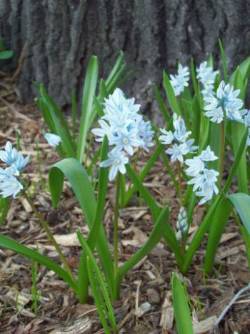Planting Spring Flowering Bulbs

Some of the first signs of spring, such as tulips, daffodils, crocus, and grape hyacinth, need to be planted in the fall so they can grace us with their beauty in the future. These bulbs need time to grow roots and must spend a certain amount of time being “chilled” in order to bloom in the spring. The end of September into October is the best time to plant bulbs to meet these requirements.
Bulbs should be planted in a location that receives full sun to partial shade to do their best. Choose a spot with good drainage, as bulbs will rot if they stay wet for extended periods. Bulbs prefer loamy soils; however, if you have a soil higher in clay or sand, you can add additional organic material to the soil, and the bulbs will do just fine. Be sure to incorporate fertilizer into the bed as you are planting; typically, a complete fertilizer or one specifically for bulbs will work best. Each species of bulb will need a slightly different planting depth. A general rule of thumb is to plant bulbs 2-3 times as deep as the bulbs are wide. For example, tulips and hyacinths should be planted about 6” deep, while daffodils should be planted 6-8” deep. Be sure to water the bulbs thoroughly after they have been planted, and water them regularly throughout the fall if there is no rainfall.
When planting bulbs, use masses of one type or color rather than spreading them out randomly in a bed, as small, irregular plantings or masses provide a better display than planting bulbs individually. Even though there won’t be any growth above the soil, the bulbs are setting down roots that will help them thrive in the spring. Cover the area with mulch to reduce the amount of moisture lost and to provide insulation for the plants.

Have questions? Contact our office where our Horticulture Extension Agent will assist you with questions.
Phone: (316) 321-9660
Email: callae@ksu.edu